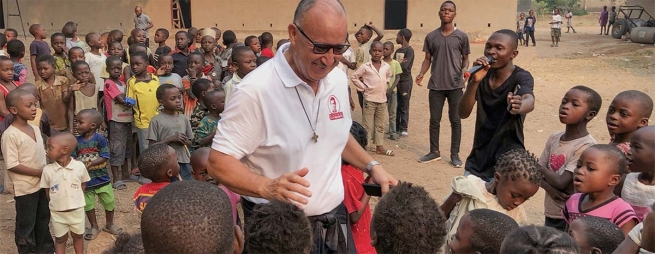In the diary of Fr. Antúnez's trip, which took place in the middle weeks of last August, the pages were filled with notes and projects. If extreme situations require one to face them with special imagination and courage, ordinary ones demand a similar dose of perseverance and confidence.
Take Masina, for example, a belt of the Democratic Republic of Congo's capital, Kinshasa. An area of 10 km2 is home to more than 4 million inhabitants, of whom about 2.2 million are minors. It is estimated that as many as 193,000 children and young people between the ages of 6 and 13 do not go to school there!
Paying a heavier toll than men are women: 80 percent of the illiterate are members of the female sex, who are forced to take care of offspring abandoned by their husbands and the household, which is considered her sole burden.
"The message we would like to give on World Literacy Day," emphasizes the President of Missions Don Bosco, "is to put the focus on schools, especially for girls. Through them you really make an investment in the future of society." The repercussions are seen in the areas of health education, family planning, child care, but also civic awareness and entrepreneurship related to actual needs.
With the resources that Masina's Salesians, led by Father Ghislaine Nkiere, also put together with the help of donors, four school courses have been organized. Starting with the oratory, which involves about 3,000 people, four formation cycles have been activated, lasting 10 weeks. Involving 124 girls at a time (110 teenagers between the ages of 15 and 18 and 14 single mothers aged 18 to 20) who will learn the rudiments of reading, writing and numeracy. They will thus have the opportunity to approach their children's lives and futures with more awareness of themselves and the world around them. At the end, they will take a follow-up test.
This is just one of the many school projects recently started in the two Congo, similar in purpose to the others that "Missioni Don Bosco" is supporting at the moment in Africa, in Gambella (Ethiopia), in Monrovia (Liberia), in Ivato (Madagascar), in Bamako (Mali) and in Namugongo (Uganda); or in India, in Parulia; or in Brazil, in Rio de Janeiro and in Areia Branca. They are a vector of empowerment in cultures where child care is neglected to say the least and gender inequality is pervasive.
"We bring a drop to the desert," Fr. Antúnez observes, "but it is still true that some at least manage to quench their thirst to survive and to support others."
For more information, visit: www.missionidonbosco.org


